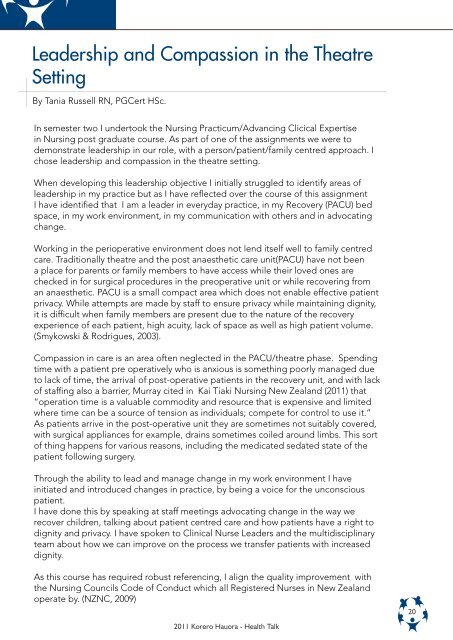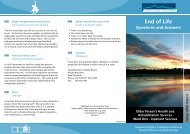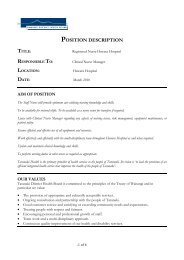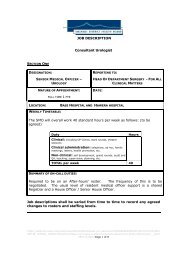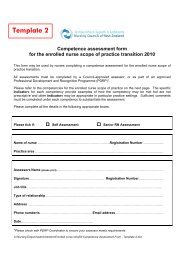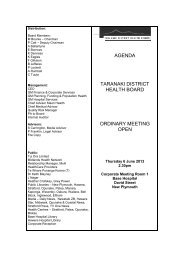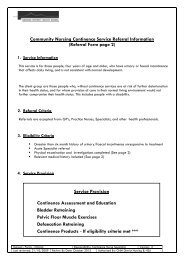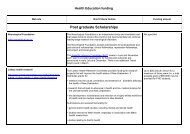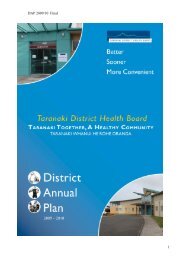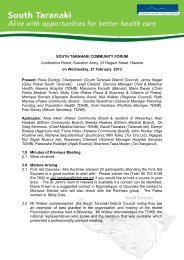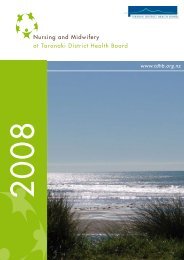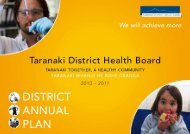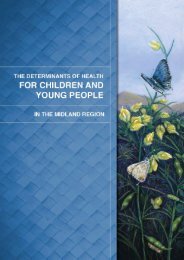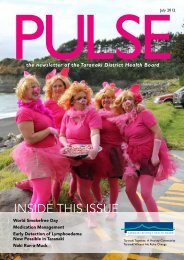Korero Hauora Health Talk - Taranaki District Health Board
Korero Hauora Health Talk - Taranaki District Health Board
Korero Hauora Health Talk - Taranaki District Health Board
You also want an ePaper? Increase the reach of your titles
YUMPU automatically turns print PDFs into web optimized ePapers that Google loves.
Leadership and Compassion in the TheatreSettingBy Tania Russell RN, PGCert HSc.In semester two I undertook the Nursing Practicum/Advancing Clicical Expertisein Nursing post graduate course. As part of one of the assignments we were todemonstrate leadership in our role, with a person/patient/family centred approach. Ichose leadership and compassion in the theatre setting.When developing this leadership objective I initially struggled to identify areas ofleadership in my practice but as I have reflected over the course of this assignmentI have identified that I am a leader in everyday practice, in my Recovery (PACU) bedspace, in my work environment, in my communication with others and in advocatingchange.Working in the perioperative environment does not lend itself well to family centredcare. Traditionally theatre and the post anaesthetic care unit(PACU) have not beena place for parents or family members to have access while their loved ones arechecked in for surgical procedures in the preoperative unit or while recovering froman anaesthetic. PACU is a small compact area which does not enable effective patientprivacy. While attempts are made by staff to ensure privacy while maintaining dignity,it is difficult when family members are present due to the nature of the recoveryexperience of each patient, high acuity, lack of space as well as high patient volume.(Smykowski & Rodrigues, 2003).Compassion in care is an area often neglected in the PACU/theatre phase. Spendingtime with a patient pre operatively who is anxious is something poorly managed dueto lack of time, the arrival of post-operative patients in the recovery unit, and with lackof staffing also a barrier, Murray cited in Kai Tiaki Nursing New Zealand (2011) that“operation time is a valuable commodity and resource that is expensive and limitedwhere time can be a source of tension as individuals; compete for control to use it.”As patients arrive in the post-operative unit they are sometimes not suitably covered,with surgical appliances for example, drains sometimes coiled around limbs. This sortof thing happens for various reasons, including the medicated sedated state of thepatient following surgery.Through the ability to lead and manage change in my work environment I haveinitiated and introduced changes in practice, by being a voice for the unconsciouspatient.I have done this by speaking at staff meetings advocating change in the way werecover children, talking about patient centred care and how patients have a right todignity and privacy. I have spoken to Clinical Nurse Leaders and the multidisciplinaryteam about how we can improve on the process we transfer patients with increaseddignity.As this course has required robust referencing, I align the quality improvement withthe Nursing Councils Code of Conduct which all Registered Nurses in New Zealandoperate by. (NZNC, 2009)202011 <strong>Korero</strong> <strong>Hauora</strong> - <strong>Health</strong> <strong>Talk</strong>


